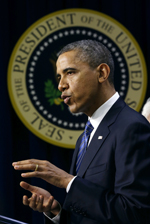WASHINGTON - Weeks after he took office, President Barack Obama met privately with 40 grieving Americans, many clutching photographs of loved ones lost in terrorist attacks.
The new president told them he would be closing Guantanamo Bay military prison within the year and putting many of the detainees there on trial in the U.S., where justice would be swifter.
Five years later, the first and probably only federal court trial of a Sept. 11,2001-related case will start jury selection today at a U.S. District courthouse in lower Manhattan, not far from where the World Trade Center once stood.
In addition to being the first opportunity for Obama to fulfill that 2009 pledge, it will likely be the only chance for New Yorkers, the community most damaged in the worst terror attack in U.S. history, to have such a trial on their home turf, decided by a jury of New Yorkers.
Obama’s plans to relocate other Guantanamo detainees, most notably self-confessed Sept. 11 mastermind Khalid Shaikh Mohammed and four others accused in the plot, ran into congressional roadblocks that prevented the president from trying them in New York and closing the Cuba detention facility as he promised.
But when Sulaiman Abu Ghaith, 48, Osama bin Laden’s son-in-law, who is accused of being a top al-Qaida propagandist, was arrested last year, the Justice Department brushed aside pressure to send him to Guantanamo and launched proceedings in New York, partly as a test case to demonstrate that high-profile terrorism trials could be handled safely and efficiently in the U.S.
Already Abu Ghaith’s trial has moved far faster than in the military process at Guantanamo Bay, where only a handful of tribunals have been completed. Half of the remaining 150 detainees have been cleared for release yet remain locked up, and the other half are still being held indefinitely as enemy combatants. Mohammed and his fellow defendants have been in custody for 11 years with no trial in sight.
Federal prosecutors in New York are hoping to prove that justice can move faster there. They are seeking life in prison with no parole for Abu Ghaith, who is accused of being an al-Qaida leader and calling for additional attacks after Sept. 11. Prosecutors did not seek the death penalty because Abu Ghaith is not accused of directly planning or carrying out acts of terrorism.
According to the government, soon after the twin towers fell, Abu Ghaith began encouraging Muslims to battle the U.S. “Jihad is a duty,” he proclaimed. “Americans must know that the storm of airplanes will not stop, God willing, and there are thousands of young people who are as keen about death as Americans are about life.”
Retired Deputy New York Fire Chief Jim Riches, whose son, firefighter Jimmy Riches, died at the World Trade Center, said he is eager to attend the Abu Ghaith trial in New York.
“This is where they committed the crime,” said Riches, who has also attended hearings at Guantanamo Bay and criticized those tribunals for their frustratingly slow pace. “We’ll get justice here. I’ll be dead before there’s a trial down there.”
But despite the president’s assurance that the U.S. court system is a better place to administer justice, many relatives - and politicians - question whether terrorism suspects should be prosecuted in the U.S. Some have said foreign terrorism suspects should not benefit from the same legal due-process rights afforded American citizens.
They worry detainees will exploit the U.S. court system and use trials as public platforms to spread their ideology. They say those accused of war crimes belong in the military legal system at Guantanamo Bay, safely away from U.S. shores.
“I just don’t like the thought they would even be allowed to be here, where they hurt so many people,” said Rosaleen Tallon, another parent of a firefighter lost on Sept. 11, Sean Patrick Tallon. “I don’t like the idea of giving them the satisfaction to be here near us.”
For the Justice Department, much is riding on the trial and verdict in Abu Ghaith’s case. Anything short of a life sentence could be seen as a failure.
The government has collected critical evidence, including a 22-page statement Abu Ghaith gave the FBI while being flown from Jordan to New York, and recordings of his rants calling for more attacks. An as yet unnamed prosecution witness is scheduled to testify through a live feed from England.
The defense’s star witness could be Mohammed. The defense team won an arrangement to question Mohammed in writing, theorizing he would describe Abu Ghaith as merely a low-level member of al-Qaida. Mohammed had submitted written statements that aided two other terrorism suspects, one defendant who avoided the death penalty and another who was eventuallyreleased from Guantanamo.
But the defense has had setbacks too. It lost a key witness, Salim Hamdan, bin Laden’s former chauffeur, who first agreed to testify for Abu Ghaith, then abruptly changed his mind and decided to sit out the trial. Hamdan was released from Guantanamo Bay and is living in Yemen.
Legal observers say a conviction would serve as vindication for the Obama administration and Attorney General Eric Holder.
“The attorney general can use this as an example that the courts are capable of handling terror trials,” said Aitan Goelman, who helped prosecute the Oklahoma City bombing and served as a government lawyer in New York. Asked whether Abu Ghaith’s public trial might inspire others to commit terrorist acts, Goelman said, “Some of the followers of this toxic ideology may support this guy no matter what he gets.”
Front Section, Pages 1 on 03/03/2014
